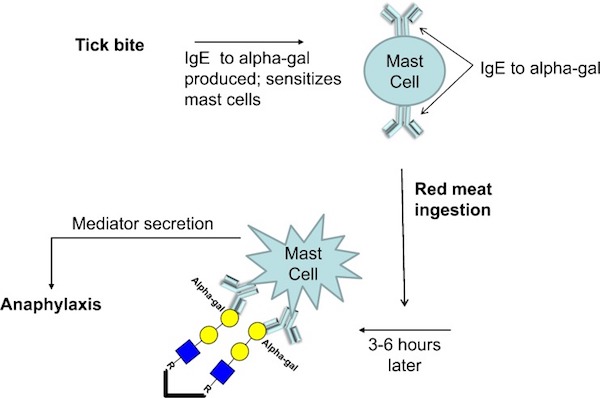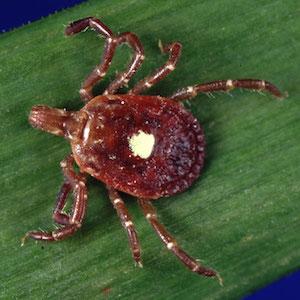Perhaps the strangest medical phenomenon discovered in recent years is a link between the lone star tick and an allergy to red meat.
The bite of a lone star tick exposes a person to a small carbohydrate called alpha-gal. In a handful of people, this exposure elicits an abnormal immune response that produces a type of antibody called IgE, which causes allergies. Because red meat also contains alpha-gal, people who have been sensitized to the carbohydrate from a tick bite can develop life-threatening anaphylaxis if they consume pork or beef.

Source: S. Wolver et al. J Gen Intern Med. 2013 Feb; 28(2): 322–325.
Now, researchers report in the Journal of Allergy and Clinical Immunology the case of a 68-year-old woman who developed anaphylaxis within minutes of receiving a shingles vaccine in 2014.
The team had encountered this woman previously. Since late 2008, she was known to suffer from red meat allergies and frequent bites from lone star ticks. Tests indicated that she had very high levels of alpha-gal-specific IgE antibodies in her blood. As it so happens, many vaccines potentially contain alpha-gal, since animal products (such as porcine gelatin and calf serum) are commonly used in vaccines. Connecting the dots, the team hypothesized that tick bites were linked to anaphylactic reactions to both red meat and vaccines.
To test their hypothesis, the researchers examined blood samples from four patients with red meat allergies (including that of the 68-year-old woman) to determine if their IgE antibodies reacted to five different vaccines: Shingles, MMR, yellow fever, and two versions of TDaP. Their results suggested that, indeed, alpha-gal is present in MMR and shingles vaccines. Thus, these vaccines could trigger anaphylaxis in patients who have red meat allergies.
The lone star tick is found throughout the eastern United States, most notably in the South. Though incredibly rare, the bizarre medical phenomena that these ticks can trigger in a small, unlucky group of people should be kept in mind by clinicians. For scientists, they serve as an insight into the peculiarities of immunogenetics.
Source: Cosby A. Stone, Jr. et al. "Anaphylaxis after Zoster Vaccine: Implicating Alpha-Gal Allergy as a Possible Mechanism." J Allergy Clin Immunol. Article in press. DOI: http://dx.doi.org/10.1016/j.jaci.2016.10.037




